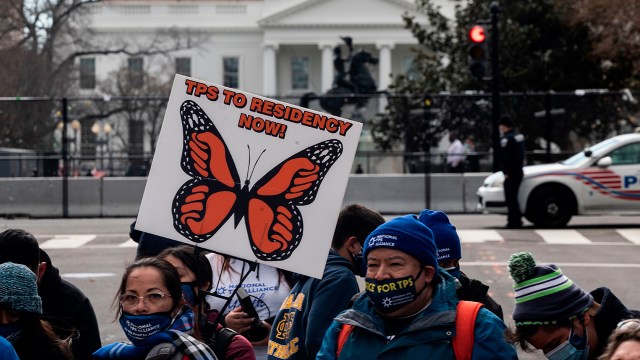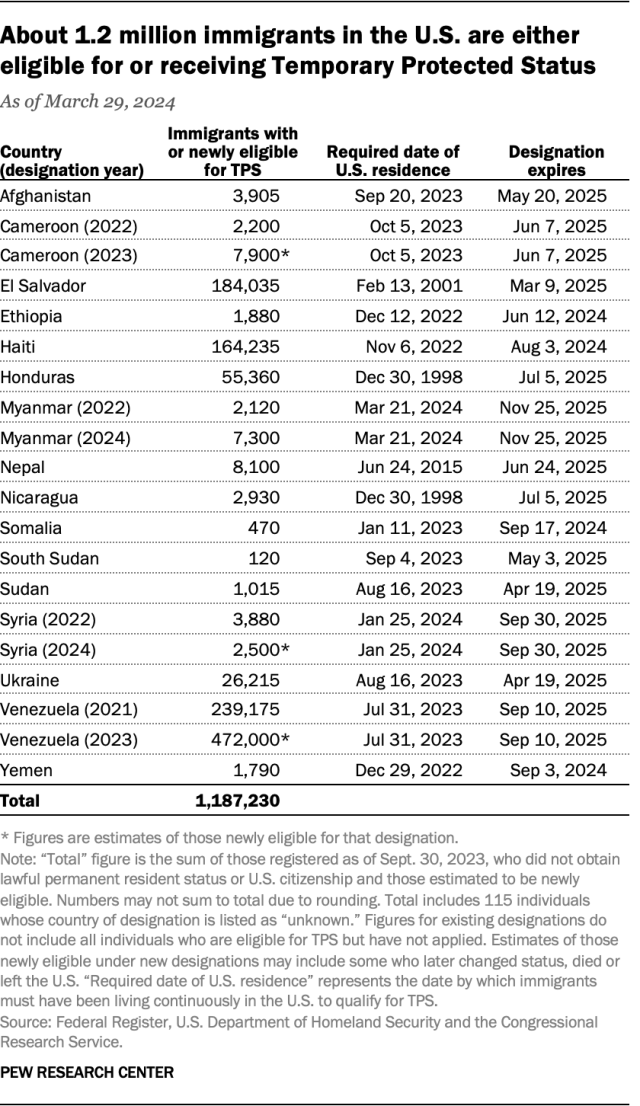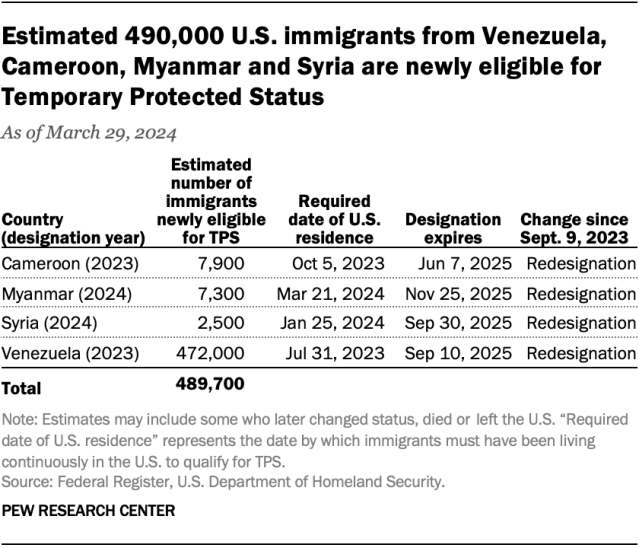
Since President Joe Biden took office in January 2021, his administration has greatly expanded the number of immigrants who are eligible for Temporary Protected Status (TPS) – a designation that gives them time-limited permission to live and work in the United States and avoid potential deportation.
The federal government offers TPS to qualifying immigrants who live in the U.S. and come from selected nations that are deemed unsafe to return to because of war, natural disasters or other crises.
Pew Research Center conducted this analysis to determine the number of immigrants in the U.S. who are eligible for Temporary Protected Status (TPS). The federal government, as directed by the president, determines the countries whose immigrants living in the U.S. would be eligible for TPS. TPS is granted to nationals of designated countries and to those with no nationality, but who last habitually lived in a designated country (immigrants). To apply, immigrants must have continuously lived in the U.S. at or before a date specified by the U.S. Department of Homeland Security (DHS).
For this analysis, we collected information about the TPS program published on the DHS website; Federal Register announcements about TPS benefits; and information from the Congressional Research Service.
In this analysis, TPS beneficiary numbers for most countries are taken from DHS statistics provided to the Congressional Research Service, which exclude recipients who also have lawful permanent resident status or U.S. citizenship. Some may have left the U.S. or died. For immigrants eligible for TPS from the redesignations of Cameroon, Myanmar, Syria and Venezuela, estimates of the number of people eligible were included in the most recent Federal Register notices regarding those countries’ TPS designations.

Nearly 1.2 million of the roughly 21.6 million noncitizen immigrants living in the U.S. are either receiving or eligible for TPS. These immigrants come from 16 countries: Afghanistan, Cameroon, El Salvador, Ethiopia, Haiti, Honduras, Myanmar, Nepal, Nicaragua, Somalia, South Sudan, Sudan, Syria, Ukraine, Venezuela and Yemen.
Federal immigration officials may grant TPS for up to 18 months based on conditions in immigrants’ home countries, and they may repeatedly extend this eligibility if dangerous conditions in those countries persist.
The Biden administration cited dangerous conditions in Cameroon, Myanmar, Syria and Venezuela when it recently expanded TPS protections to immigrants from those countries. The Federal Register provides detailed information about each of these countries’ designations.

The recent TPS expansions continue the Biden administration’s efforts to broaden the program.
Since 2021, the Department of Homeland Security – which oversees the program – has added Afghanistan, Cameroon, Ethiopia, Myanmar, Ukraine and Venezuela to the list of countries whose immigrants may qualify for TPS. It also extended the terms of eligibility for immigrants from most countries that were already covered by TPS.
The Biden administration’s expansions stand in contrast to the Trump administration’s efforts to end TPS for nearly all beneficiaries. On his first day as president, Biden asked Congress to pass legislation that would allow TPS recipients who meet certain conditions to apply immediately for green cards that would let them become lawful permanent residents. Green card holders may be granted U.S. citizenship if they pass additional background checks and meet the usual naturalization conditions of knowledge of English and U.S. civics.
TPS recipients are not currently eligible for permanent residency or U.S. citizenship unless they pursue those statuses through other immigration processes.
Some TPS recipients have lived in the U.S. for decades
Immigrants with TPS live in all 50 states, the District of Columbia and U.S. territories, according to the Congressional Research Service. The largest numbers live in Florida, Texas, California and New York – all of them states with large immigrant populations.
Some current TPS beneficiaries have lived in the U.S. for two decades or more. For example, those from Honduras and Nicaragua have been eligible because of damage from Hurricane Mitch in 1998, provided they have been living in the U.S. since Dec. 30 of that year. And current protections for immigrants from El Salvador apply to those who have lived in the U.S. since Feb. 13, 2001, following a series of earthquakes that killed more than a thousand people and inflicted widespread damage there.
Deferred Enforced Departure also offers protection from deportation
Another form of temporary relief from deportation, called Deferred Enforced Departure (DED), is granted at the president’s discretion, rather than as a result of an administrative process in the U.S. Department of Homeland Security. It usually follows catastrophes in immigrants’ home countries similar to those that have triggered TPS. Currently, certain immigrants from Liberia, Hong Kong and the Palestinian territories are eligible for this benefit and are also allowed to apply for authorization to work. Liberian immigrants with DED have relief until June 30, 2024, and those from Hong Kong until Feb. 5, 2025. The president recently enacted DED for immigrants from the Palestinian territories for 18 months starting Feb. 14, 2024.
To be granted TPS, applicants must meet filing deadlines, pay a fee, and prove they have lived in the U.S. continuously since the events that triggered relief from deportation. They must also meet criminal record requirements. For example, they must show that they have not been convicted of any felony or two or more misdemeanors while in the U.S.; persecuted others; or engaged in terrorism.
Once the Department of Homeland Security determines that a nation’s immigrants are eligible for TPS, those immigrants can apply for deportation relief if they entered the U.S. without authorization or entered on a temporary visa that has since expired. Those with a valid temporary visa or another non-immigrant status, such as foreign students, are also eligible to apply.
Federal officials are required to announce 60 days before any TPS designation expires whether it will be extended. Without a decision, it automatically extends for another six months.
Congress and President George H.W. Bush authorized the TPS program in the 1990 immigration law, granting the White House executive power to designate and extend the status to immigrants in the U.S. based on certain criteria.
Note: This is an update of a post originally published Oct. 28, 2021.
